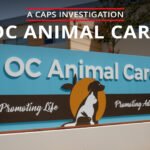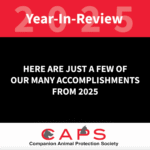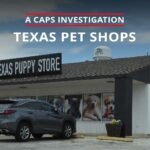Testimony of: Deborah A. Howard, Founder/President, Companion Animal Protection Society (CAPS) Submitted to: Senate Standing Committee on Business, Professions and Economic Development Regarding: AB 485, An act regarding pet store operators and the sale of dogs, cats, and rabbits Date: July 17, 2017
Chairman Hill, Vice-Chairwoman Fuller, and Honorable members of the Committee, on behalf of CAPS and its supporters in California, I thank you for considering my testimony in support of AB 485 as amended in the Senate on June 27, 2017. I am a native Californian who grew up in Los Angeles. My law degree is from Santa Clara Law. CAPS plans to relocate from the Boston area to Southern California later this year.
Mission
Founded in 1992, the Companion Animal Protection Society (CAPS) is the only national nonprofit dedicated exclusively to protecting companion animals from cruelty in pet shop and puppy/kitten mills. CAPS addresses animal suffering through investigations, legislation, education, media relations, consumer assistance, and rescue.
Background
When consumers buy puppies and kittens from pet shops, they condemn the parents to further inhumane treatment in mills – large commercial breeding facilities, most of which are USDA-licensed, that mass-produce puppies and kittens for resale in pet shops and online. By its very nature, the pet shop and puppy/kitten mill industry creates an endless cycle of animal overpopulation, mistreatment, and consumer deceit, causing needless shelter euthanasia and costing defrauded consumers millions of dollars each year.
CAPS’ Expertise
With decades of experience focusing exclusively on all aspects of the pet shop and puppy/kitten mill industry, CAPS is uniquely qualified to provide expert testimony and investigative evidence. We have strong relationships with key players in all levels of government, other nonprofits, and the media. CAPS is the only national organization that investigates inside USDA-licensed dog and cat breeding facilities (more than 1,000 to date).
Brokers
CAPS is very familiar with USDA-licensed “B” dealers (brokers). A CAPS investigator worked undercover for six months at Goodman, Missouri-based The Hunte Corporation, the largest dog brokerage facility in the country. Hunte (also using the new name of Choice Puppies) supplies puppies to California pet shops. An investigator’s undercover employment at the most notorious dog brokering/breeding facility in the country, Kathy Bauck’s Pick of the Litter in New York Mills, Minnesota, resulted in Bauck’s criminal conviction for animal cruelty and revocation of USDA license. Bauck had 900 adults and 400 puppies during the CAPS investigator’s six weeks of employment.
Pet Shop Investigations
CAPS is also well-versed in pet shops that sell puppies and kittens. Two of our investigators worked undercover at Petland franchises. “Dateline” featured some of our Petland evidence in the hour-long segment, “A Dog’s Life,” which took 13 months of close work between the producer and CAPS. The exposé, which examined every aspect of the pet shop/puppy mill industry, won a Genesis award. CAPS has conducted undercover investigations of every pet shop selling puppies/kittens in New York City and adjacent counties (a total of 90). Our California undercover work includes investigations of every California pet shop that sells puppies and kittens and some stores that sell rabbits.
Ordinance Work
CAPS has generated and worked on municipal ordinances banning the retail sale of pet shop puppies, kittens and rabbits in Los Angeles, San Diego, West Hollywood, Glendale, and South Pasadena. Our Sarasota County ordinance was the first countywide ordinance in Florida. Restrictive ordinances include New York City, Suffolk and Nassau Counties. In addition, CAPS provides legal expertise and pleadings on behalf of municipalities being sued over ordinances (the most recent is New York City). IB Times and Newsweek have covered CAPS’ work as the national leader in the pet shop ordinance movement. Since the West Hollywood ordinance passed in 2010 – the genesis for the ordinance movement in the United States and Canada – municipalities in the United States and Canada have passed more than 230 ordinances. However, given the number of municipalities in California, a state law is far more efficient – and more consistent for law enforcement – than individual ordinances.
Pet Shop Investigations
CAPS has investigated every California pet shop selling puppies and kittens for ordinance work and for consumer fraud and noncompliance with California Health & Safety Code §§122125 – 122220 (hereinafter “lemon law”). In the short documentary below, CAPS’ filmmaker follows investigators as they go undercover to Southern California pet shops and expose the true source of the puppies. CAPS has investigated some of the USDA-licensed breeders who supplies puppies to California pet shops.
Undercover with CAPS: An Investigation of Southern California Pet Shops: https:vimeo.com/189367133
Barkworks (Brea, Riverside and Thousand Oaks; formerly Cerritos)
CAPS has received a number of complaints for sick and dying puppies from this pet shop chain, which used to have seven locations. This chain has the worst alleged consumer fraud we have encountered during any of our California pet shop investigations. We believe statements by Barkworks employees may violate California Civil Code Section 1750 et seq. “Consumer Legal Remedies Act,” specifically §1770.
For example, pet shop employees claimed that USDA requires breeding dogs to be spayed/neutered after three litters and then adopted out to homes or retired. Right after an employee showed CAPS investigators a “healthy” puppy, claiming it was against the morals of the store to sell sick puppies, a CAPS investigator pointed out that the puppy was underweight and had a cough. Another employee claimed that the breeding dogs don’t live in cages and have a lot of room because the breeders have acres. In addition, this employee said that the breeders only breed female dogs once or twice in a dog’s lifetime. One employee refused to provide breeder information unless the CAPS investigator purchased a puppy despite the investigator pointing out the required sign mandating the store provide this information to prospective purchasers. CAPS has investigated some of the USDA-licensed breeders who supply puppies to the Barkworks chain.
Undercover with CAPS: An Investigation of Barkworks: https:vimeo.com/225159022
Undercover with CAPS: An Investigation of Southern California Pet Shops: https:vimeo.com/189367133
Barkworks: Alleged Violations of California Civil Code §1770 (see attached report)
Barkworks investigation videos and reports (available upon request)
David Salinas’ Pet Shops (Temecula, Corona, Escondido and National City; formerly San Diego, San Marcos and Oceanside)
CAPS has been investigating David Salinas’ puppy sales since 2011. Before he opened his first pet shop, San Diego Puppy, Salinas sold puppies from his home. CAPS has received complaints for sick and dying puppies sold by Salinas and his pet shops. Salinas sued CAPS over the San Diego ordinance banning the retail sale of dogs, cats and rabbits. A federal judge dismissed his lawsuit and allowed CAPS to seek attorneys’ fees, which we did through an Anti SLAPP motion. Attorneys for CAPS and another nonprofit have yet to collect attorneys’ fees awarded by the court in September 2015.
A July 2017 CAPS undercover investigation of National City Puppy documents David Salinas stating that “we don’t work with puppy mills.” Employees at other Salinas-owned pet shops also claimed during our investigations that store puppies were not from mills. One employee stated that if a breeder has USDA violations, then this breeder “would be completely shut down from being able to sell anything.”
CAPS investigations of some of the USDA-licensed breeders supplying Salinas’ pet shops prove that the puppies do, in fact, come from mills. In addition, the brokers who deal directly with Salinas’ pet shops are known to buy from mills, some of which CAPS has investigated.
CAPS investigations of Beach Buddy Puppies in Oceanside provided a number of supposed California breeders providing puppies to the store. The Oceanside ordinance required that pet shops obtain puppies solely from breeders who sold fewer than 20 dogs a year. CAPS’ research uncovered that none of the breeder names matched up with the addresses, with the exception of one. The exception was Lawrence (spelled Laurence on store paperwork) Zwirn, who is not a dog breeder but the owner of a supplement company and a contestant on season 2 of “Millionaire Matchmaker.” The address was for his supplement company in Los Angeles. Our investigation of this address indicated that the company had relocated. We have reason to believe that David Salinas and Beach Buddy Puppies may have violated California Civil Code Section 1750 et seq. “Consumer Legal Remedies Act, ” specifically §1770, by providing allegedly fraudulent information.
Undercover with CAPS: An Investigation of David Salinas’ Pet Shops: a href=”https://vimeo.com/224887882″ target=”_new”>https://vimeo.com/224887882
Undercover with CAPS: An Investigation of Southern California Pet Shops: a href=”https://vimeo.com/189367133″ target=”_new”>https://vimeo.com/189367133
David Salinas/Beach Buddy Puppies: Alleged Violations of California Civil Code §1770 (see attached report)
David Salinas pet shop investigation videos and reports (available upon request)
Animal Kingdom (Santa Maria, Grover Beach and Pismo Beach)
Our investigations of Animal Kingdom at the Santa Maria location revealed violations of the lemon law. When CAPS first investigated Animal Kingdom in 2015, employees supplied complete information (some of it was inaccurate) for USDA-licensed breeders in the Midwest and first names and addresses of breeders in California. The chain now claims to use only California dog and cat breeders. During a CAPS investigation in July 2017, employees again provided only first names and addresses of California breeders. They said that they normally can’t show breeder names and told the investigator to not write down the names. In addition, store paperwork has only first names and addresses in Kern County. CAPS research uncovered addresses that don’t exist or empty lots. Some breeder names do match up with addresses, but we wonder if people who live in small houses are able to supply the myriad breeds available at the three Animal Kingdom locations.
Animal Kingdom investigation video and report (available upon request)
Puppy Heaven (Agoura Hills)
Puppy Heaven was formerly Star Yorkie in Reseda. After CAPS provided investigative evidence to the City Attorney and Los Angeles Animal Services, LAAS finally cited Star Yorkie for operating a pet shop in a residential zone. Relocated to Agoura Hills and renamed Puppy Heaven, the pet shop continues to violate the lemon law: failing to post signs regarding consumer rights; refusing to reveal breeder names and other required information to prospective consumers; failing to post state of origin signs on cages by keeping cages in a back room; and providing sales documentation with incorrect breeder information.
Puppy Heaven investigation video and report (available upon request)
USDA
We’ve investigated many pet shops in the state that claim they don’t use puppy or kitten mills because the facilities from which they obtain animals are USDA-licensed. These facilities, however, are puppy and kitten mills.
CAPS’ evidence and two-hour meeting arranged by our pro bono Washington, D.C. law firm, Crowell & Moring, was the impetus for the scathing Office of Inspector General (OIG) report on the USDA’s failure to enforce to Animal Welfare Act (AWA) as it pertains to commercial dog/cat breeders and brokers. CAPS investigators cite AWA regulations in reports and on undercover videos. We have compared our findings with those of USDA inspectors. While USDA relies on our evidence for their investigations and cases, CAPS’ undercover investigations and analysis of USDA inspection reports reveal that the agency’s enforcement of the AWA is extremely lax. Despite strong recommendations by OIG to use enforcement rather than education, USDA continues to emphasize education.
In addition, USDA removed the online data base of inspection reports in February 2017. Thus, consumers cannot look up breeder and broker violations even if they found the data base and wanted to practice due diligence. CAPS has joined with Animal Legal Defense Fund and two other nonprofits to sue USDA over the removal of the data base.
AB 485 Proposed Penalty
In our correspondence with Assemblymember Patrick O’Donnell’s legislative assistant, CAPS asserted that, based on our interactions with animal controls in trying to get California pet shops to comply with the lemon law, infractions for a state retail ban would not be a deterrent. Therefore, we recommended stronger penalties. We are pleased to see a penalty of $500 per animal. These fines can help to fund enforcement efforts.
Conclusion
Banning the retail sale of dogs, cats and rabbits in California – and making shelter and rescue animals available through retail establishments and mobile adoption – will save lives. Many more people will have opportunities to meet and adopt these animals when they are available outside of shelters and rescue facilities.
I urge the committee to vote to pass AB 485. This legislation will help put an end to the cycle of suffering created by the horrific pet shop and puppy/kitten mill industry. Thank you for your consideration.



